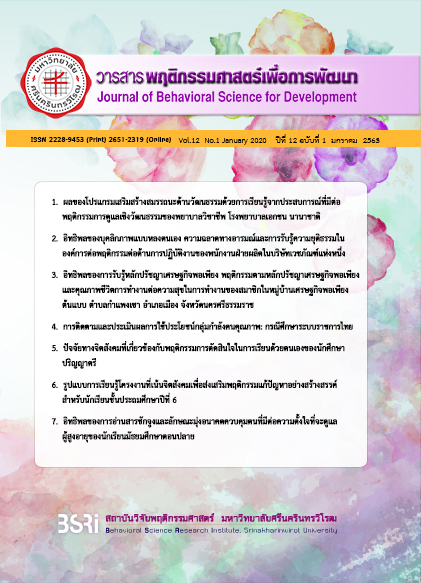อิทธิพลของบุคลิกภาพแบบหลงตนเอง ความฉลาดทางอารมณ์และการรับรู้ความยุติธรรมในองค์การต่อพฤติกรรมต่อต้านการปฏิบัติงานของพนักงานฝ่ายผลิตในบริษัทเวชภัณฑ์แห่งหนึ่ง
Keywords:
narcissistic personality, emotional intelligence, perception of organizational justice, counterproductive work behaviors, production employeeAbstract
การวิจัยครั้งนี้มีวัตถุประสงค์เพื่อศึกษาอิทธิพลของบุคลิกภาพแบบหลงตนเอง ความฉลาดทางอารมณ์ และการรับรู้ความยุติธรรมในองค์การที่มีต่อพฤติกรรมต่อต้านการปฏิบัติงานของพนักงานฝ่ายผลิตในบริษัทเวชภัณฑ์แห่งหนึ่ง ใช้แบบสอบถามเป็นเครื่องมือในการเก็บรวบรวมข้อมูลจากพนักงานฝ่ายผลิตในบริษัทเวชภัณฑ์แห่งหนึ่งในจังหวัดนนทบุรี จำนวน 253 คน สถิติที่ใช้ในการวิเคราะห์ข้อมูล ได้แก่ ค่าร้อยละ ค่าเฉลี่ย ส่วนเบี่ยงเบนมาตรฐาน และการวิเคราะห์การถดถอยพหุคูณแบบขั้นตอน ผลการวิจัยพบว่า 1) พนักงานฝ่ายผลิตบริษัทเวชภัณฑ์แห่งหนึ่งมีความฉลาดทางอารมณ์และการรับรู้ความยุติธรรมในองค์การอยู่ในระดับสูง บุคลิกภาพแบบหลงตนเองอยู่ในระดับต่ำ และพฤติกรรมต่อต้านการปฏิบัติงานอยู่ในระดับต่ำมาก 2) ความฉลาดทางอารมณ์ด้านการตระหนักรู้เกี่ยวกับตนเอง ความฉลาดทางอารมณ์ด้านการควบคุมอารมณ์ของตนเอง ความฉลาดทางอารมณ์ด้านการจูงใจตนเอง บุคลิกภาพแบบหลงตนเองด้านอำนาจหน้าที่และการรับรู้ความยุติธรรมในองค์การเชิงปฏิสัมพันธ์ สามารถร่วมกันพยากรณ์พฤติกรรมต่อต้านการปฏิบัติงานของพนักงานฝ่ายผลิตบริษัทเวชภัณฑ์แห่งหนึ่งได้ร้อยละ 28.4 อย่างมีนัยสำคัญทางสถิติที่ระดับ .05 ผลการวิจัยนี้สามารถเป็นแนวทางในการพัฒนาเพื่อลดการเกิดพฤติกรรมต่อต้านการปฏิบัติงานของพนักงานฝ่ายผลิต
References
Baloch, M. A., Meng, F., Xu, Z., Cepeda-Carrion, I., & Bari, M. W. (2017). Dark triad, perceptions of organizational politics and counterproductive work behaviors: The moderating effect of political skills. Frontiers in psychology, 8, 1972.
Boonchai, J. (2007). Khwāmsamphan rawāng khwāmphưngphō̜čhai nai ngānkān raprū khwāmyuttitham nai ʻongkān læ phrưttikam tō̜tān kān patibat ngān khō̜ng phanakngān bō̜risat ʻēkkachon nai khētnikhom ʻutsāhakam phāk nư̄a čhangwat lamphūn [Relationships among job satisfaction, perceived organizational justice and counterproductive work behavior of private company employees in Northern Region Industrial Estate, Lamphun Province] (Master’s thesis). Chiang Mai University, Chiang Mai.
Devonish, D., & Greenidge, D. (2010). The effect of organizational justice on contextual performance, counterproductive work behaviors, and task performance: Investigating the moderating role of ability-based emotional intelligence. International Journal of Selection and Assessment, 18(1), 75-86.
Emami, S. M. (2014). The effects of emotional intelligence on counterproductive work behaviors. Management Science Letter, 4(8), 1797-1800.
Flaherty, S., & Moss, S. A. (2007). The impact of personality and team context on the relationship between workplace injustice and counterproductive work behavior. Journal of Applied Social Psychology, 37(11), 2549-2575.
Goleman, D. (1998). Working with emotional intelligence. New York: Bantam Books.
Greenberg, J., & Colquitt, J. A. (2005). Handbook of Organizational Justice. New Jersey: Lawrence Erlbaum.
Gruys, M. L., & Sackett, P. R. (2003). Investigating the dimensionality of counterproductive work behavior. Journal of Selection and Assessment, 11(1), 30-42.
Hendin, H. M., & Cheek, J. M. (1997). Assessing hypersensitive narcissism: A reexamination of Murray’s Narcism Scale. Journal of Research in Personality, 31(1), 588-599.
Joe-Akunne Chiamaka, O., Oguegbe Tochukwu, M., & Okonkwo Kizito, I. (2015). Impact of emotional intelligence and job boredom proneness on counterproductive work behaviour. Advances in Applied Psychology, 1(2), 101-106.
Keskin, H., Akgün, A. E., Ayar, H., & Kayman, Ş. S. (2016). Cyberbullying victimization, counterproductive work behaviours and emotional intelligence at workplace. Procedia - Social and Behavioral Sciences, 235, 281-287.
Khan, A. K., Quratulain, S., & Crawshaw, J. R. (2013). The mediating role of discrete emotions in the relationship between injustice and counterproductive work behaviors: A study in Pakistan. Journal of Business and Psychology, 28(1), 49-61.
Kvedarauskiene, D. P., & Gudaite, G. (2016). Relationship with authority in narcissism. International Journal of Psychology, 19, 71-88.
Maneesri, K. & Isaranon, Y. (2011). Khwāmsamphan rawāng khwām long tonʻēng læ suk phāwa [Associations between narcissism and well-being]. Proceedings of the East-West Psychological Science Research Center Faculty of Psychology, Chulalongkorn University (Vol. 10, pp. 69-75). Bangkok: DTS Copy Digital Limited Partnership.
Miao, C., Humphrey, R. H., & Qian, S. (2017). Are the emotionally intelligent good citizens or counterproductive? A meta-analysis of emotional intelligence and its relationships with organizational citizenship behavior and counterproductive work behavior. Personality and Individual Differences, 116(1), 144-156.
Penney, L. M., & Spector, P. E. (2002). Narcissism and counterproductive work behavior: Do bigger egos mean bigger problems?. International Journal of Selection and Assessment, 10(1-2), 126-134.
Prasithrathsin, S. (2005). Theknik kān wikhro̜ tūaprǣ lāi tūa samrap kānwičhai thāng sangkhommasāt læ phrưttikam sāt [Multiple variable analysis techniques for social science and behavioral research] (5th ed.). Bangkok: Three Lada Limited Partnership.
Raskin, R., & Terry, H. (1988). A principal-components analysis of the narcissistic personality inventory and further evidence of its construct validity. Journal of Personality and Social Psychology, 54(5), 890-902.
Shkoler, O., & Tziner, A. (2017). The mediating and moderating role of burnout and emotional intelligence in the relationship between organizational justice and work misbehavior. Revista de Psicologia del Trabajo y de las Organizaciones, 33(2), 157-164.
Szalkowska, A., Zemojtel-Piotrowska, M., & Clinton, A. (2015). Entitlement and organizational behaviors: The moderating role of narcissism. Current Issues in Personality Psychology, 3(4), 230-241.
World Health Organization. (2013). Report of the WHO Deadly Medicines Contamination in Pakistan. Retrieved from https://www.who.int/features/2013/pakistan_medicine_safety/en/
Yamané, T. (1973). Statistics: An introduction analysis (3rd ed.). New York: Harper and Row.
Ying, C. Y., & Ting, S. K. T. (2013). The effects of emotional intelligence on counterproductive work behaviors and organizational citizenship behaviors. International Journal of accounting and business management, 1(1), 185-196.



